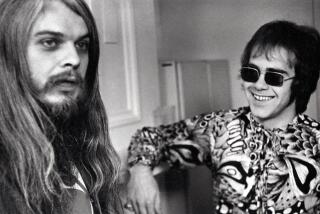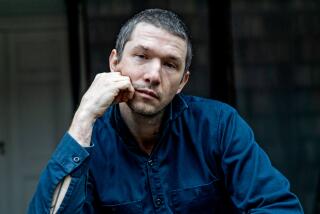<i> The World as I Found It</i> by Bruce Duffy (Ticknor & Fields: $19.95; 547 pp.)
Here are nearly 550 pages of a most unusual, even preposterous venture: a novel constructed out of the lives, the thoughts, the appetites, the egos and the very toenails and pocket watches of the philosophers Ludwig Wittgenstein, Bertrand Russell and G. E. Moore.
It is hard to know which is more outsized; the talent of Bruce Duffy, the author, or his nerve. Sometimes they are the same thing, sometimes not. Duffy is a superb writer though not always a prudent one. The successes of “The World as I Found It” are astonishing; its defeats are less astonishing, given its ambition, though perhaps they are not always necessary.
“Passion” may be more accurate than “ambition.” This is Duffy’s first novel, and he is equipped to be a very fine novelist and perhaps more; but in this case, he is novelizing in the service of a passion that both makes this an extraordinary book and sometimes gets in its way.
Duffy introduces plenty of philosophy, as clearly as possible; particularly in the case of Wittgenstein, the major character, and Russell, his patron and antagonist. But his purpose--and much of the astonishing success--is to write about thought as one of the vital signs of life.
He makes vivid characters out of the three men, and he makes their ideas traits of these characters. With Wittgenstein, ideas are energy, ego and a mystical will to prevail. With the arrogant and insecure Russell, they are the will to maneuver. With the gentle Moore, they are the will to give way to any better argument.
A great deal more than diplomacy is war by other means. Poetry--read Robert Lowell’s biography--is war by other means. Cooking and seduction are wars by other means. Philosophy, Duffy tells us, is war (or with Moore, conscientious objection) by other means.
The author asserts in a brief preface that he has used the principal lines of the three lives--diaries and letters are freely quoted--but that he has transposed and invented details. It is a novel by texture, to put it roughly, and a triple biography by plot; real bones with a fictional skin and a large life. It is a fusion that suggests Jacques Maritain’s phrase: “The dreamers of what is true.”
Duffy’s Wittgenstein, son of a rich and overbearing Viennese steel magnate, comes to Cambridge as a young man to study under Russell. He is a most unabashed disciple; before long, he is subjecting Russell’s work on mathematical logic to devastating criticism.
The book recounts their collaboration and growing differences; it portrays quite brilliantly Russell’s fascination with the younger man whose rigorous logic is voiced with a prophet’s certainty. Best of all, it gives a subtle picture of a philosopher’s mixture of excitement and agony at being overborne by a deeper mind.
In one of many witty vignettes, the author has Russell telling Ottoline Morrell, his Bloomsbury lover, of how he destroyed the work of the German philosopher Gottlob Frege; and of Frege’s cordial acknowledgments. Lady Morrell is mystified by Russell’s complacency. “He is in your debt,” she says ironically. The real irony, of course, is that it was Frege who sent Wittgenstein to study with Russell.
Philosophic dueling provides some of the book’s most exhilarating moments. There is a superbly comical and instructive scene that has Russell, Wittgenstein and Moore--who throughout is a kind of balance-wheel between the others--attending a Cambridge discussion group toward the end of their lives. Wittgenstein stalks out after one speaker accuses him of picking up a poker to threaten him; Russell shrieks with frustration at seeing his rival depart before he can tackle him.
Moore is sketched rightly, but what emerges is a stunningly graceful portrait. He is an innocent with large appetites. Duffy writes several splendid pages that describe Moore making his prodigious way through an enormous and greasy Cambridge meal. His late-life courtship of a student is funny and touching; later, Duffy provides a brilliant account of how their marriage balances her need for intimacy and his for abstraction.
Russell’s portrait is less subtle--as Russell himself was less subtle--but it is vastly entertaining. Duffy gets full measure of his restlessness, the need for attention that made much of his philosophizing rather shallow, his egotism and his perpetual philandering. The school that he runs with his feminist wife is a wacky mixture of the earnest and the cock-eyed. Russell interviews the new woman teachers and urges them, in gravely paternal tones, to sleep with him.
Duffy can so pleasure us with a phrase that some of the pleasure rubs off on the character. Describing Russell’s snobbish one-upmanship, he calls him “master of the seemingly good-natured slight, fraught with elan and bonhomie, which fizzed up like a fatal heartburn in the person slighted.”
Wittgenstein is the book’s center both of gravity and energy. He is the figure with whom Duffy risks the most, achieves a lot, and sometimes fails. Where the other two appear and disappear, suiting the author’s firework rhythms, with Wittgenstein, a full-scale fictional biography is attempted.
His childhood in the oppressive pre-World War I wealth of Vienna is spelled out. So is the overbearing presence of his enormously successful father. Meals are described, course by rich course; and concerts and family gatherings are presented with a steamy weight that makes “Buddenbrooks” seem like a French farce.
Wittgenstein’s burdens are set out: the suicide of his two older brothers, his guilt over concealing his Jewishness, his homosexuality. There are long sections on his ordeal in the World War I trenches, and his spells of brooding rustication in Norway, and later as a village schoolteacher in Austria.
It is an impressive, tormented portrait. It succeeds by dint of cumulative detail in suggesting convincing parallels between the strains and ambiguities of Wittgenstein’s life, and the extraordinarily severe--and paradoxically liberating--restrictions he put on the meaning and uses of language.
In truth, the biographical detail is excessive; it weighs down and distorts the rich intellectual and emotional play in the lives and strivings of the three philosophers. If much of the writing is quite marvelous, there are whole pages of routinely presented facts and expository intellectual history. Duffy’s formidable fictional ability to bring moments and characters to life raises novelistic expectations that are frequently dashed by the “and then . . . and then . . .” plodding of the biographical form.
It is, of course, an easy way out for a reviewer to suggest that more editing would have helped. Clearly, it would have had to be administered by a manic energy equivalent to the author’s. No doubt, quite a bit was done, in any case, and perhaps exhaustion set in.
Still, if its mid-section and later sagging is a problem, “The World as I Found It”--a Wittgenstein phrase suggestive of his passionately provisional approach to reality--is a treasure-house, even if unwieldy. It would take a much longer review to suggest the variety of ungroomed pleasures to be found in it, along with the complex and moving portrait of a man whose intellectual energy burned like an acid so pure and corrosive that there was no container it could rest in.
More to Read
Sign up for our Book Club newsletter
Get the latest news, events and more from the Los Angeles Times Book Club, and help us get L.A. reading and talking.
You may occasionally receive promotional content from the Los Angeles Times.







